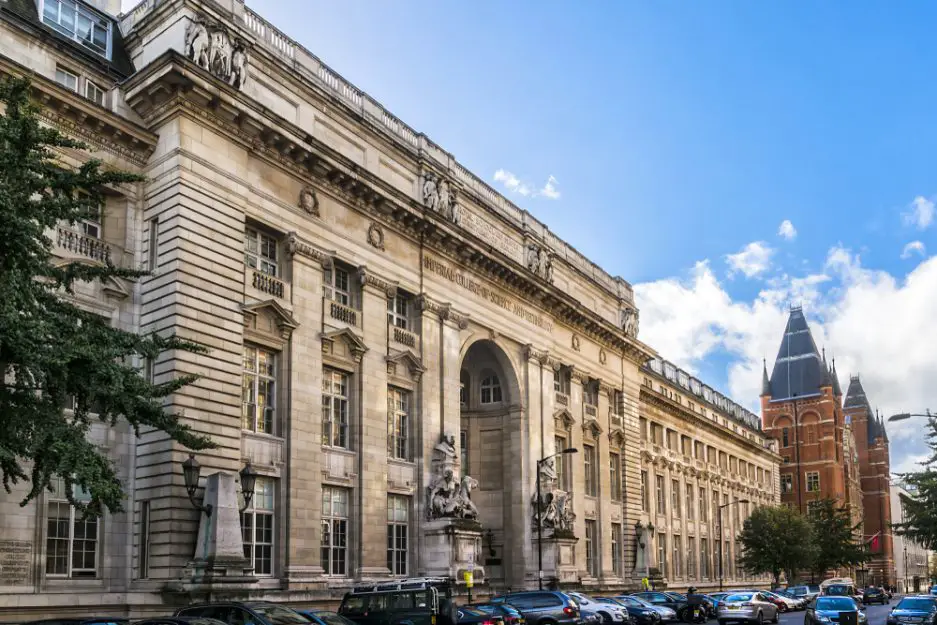Study at Imperial College London
Study at Imperial College London
The gold standard for science degrees in England

Imperial College London was ranked #9 in the Times Higher Education World University Rankings 2019. Founded in 1907, the university is located in one of central London’s most lively and beautiful areas, next to palaces, parks, concert halls, and museums. Imperial specialises in the fields of science, technology, and business: a new business school was opened in 2004. It boasts 14 Nobel Prize winners among its alumni, including Alexander Fleming who discovered penicillin, as well as three Fields Medallists. The University, therefore, has a strong reputation for pioneering research, and was placed #2 in Europe in the Reuters Top 100 Innovative Universities 2018. Undergraduate students have the opportunity to gain their own research experience through the invaluable Undergraduate Research Opportunities Programme (UROP)
Imperial College London is a truly global community, indeed it is the UK’’s most international university, and one of the world’s top 10, with its student body representing 140 countries.
Studying at Imperial opens more doors than any other British university: the 2019 University Guide placed Imperial College London #2 in the UK for career prospects, with a score of 90.5/100

Academic matters
Imperial College London is one of the world’s top universities for science and technology and includes departments such as Chemistry, Physics, Computing, Engineering and Medicine. Many degree programmes contain a combination from these departments, such as Biological Sciences with Management or even Chemistry with German or Spanish for Science. Many courses also include a year in industry or research, an indispensable opportunity if students wish to continue with postgraduate study or boost career projects.
Imperial College Business School offers an MBA, Masters programmes in a variety of management, finance, and specialised topics, as well as a doctoral programme.
Teaching at Imperial is mostly in the form of lectures, and smaller, more interactive seminars (conducted by postgraduate students or other academic staff). There is a strong emphasis on practical experience, so a key aspect of courses are regular practical sessions in laboratories.
Student life
With over 350 clubs and societies, from cultural organisations, to calligraphy, guitar, gaming or tennis, students at Imperial College London have plenty of activities to get involved in outside of class, to help broaden their intellectual, cultural and social horizons. Degree programmes also have their own societies, which provide an opportunity to meet and socialise with coursemates and enthusiasts outside of the classroom or the lab. Students can start their own societies. A full list of clubs and societies can be found here.
Imperial is located in one of London’s most prosperous neighbourhoods, South Kensington. A stone’s throw from top concert venues such as the Royal Albert Hall, the beautiful Kensington Park and Kensington Palace, many foreign embassies, and a cluster of the world’s greatest museums, such as the Natural History Museum, the Science Museum, the Victoria and Albert Museum, all of which are free of charge. Kensington is also home to a plethora of bars, restaurants, bars, and shopping opportunities. The student association, the Imperial College Union also runs its own bar, ‘FiveSixEight’ (the number of millilitres in a pint!) with drinks and snacks at discounted prices.
Imperial is located in one of London’s most prosperous neighbourhoods, South Kensington. A stone’s throw from top concert venues such as the Royal Albert Hall, the beautiful Kensington Park and Kensington Palace, many foreign embassies, and a cluster of the world’s greatest museums, such as the Natural History Museum, the Science Museum, the Victoria and Albert Museum, all of which are free of charge. Kensington is also home to a plethora of bars, restaurants, bars, and shopping opportunities. The student association, the Imperial College Union also runs its own bar, ‘FiveSixEight’ (the number of millilitres in a pint!) with drinks and snacks at discounted prices.
How do I apply?
As with all UK universities, candidates apply through UCAS. Students may make up to 5 choices of universities, EXCEPT for medical students, who can apply up to 4 medical courses, and a fifth, non-medical course.
French students require a Baccalaureate score of 15-17, and a recognised and standardised English language proficiency test such as an IELTS score of 6.0-7.0. Please see the individual department webpage for requirements for your chosen course
On UCAS, candidates upload a letter of motivation (Personal Statement), their predicted exam marks, and a letter of recommendation from one of their teachers. Students may only submit 1 Personal Statement for all the universities they apply for (maximum of 5 choices). The Personal Statement, no more than 4,000 characters, should explain why students want to study their chosen course, what aspects particularly interest them, what steps they have already taken to engage with the subject (reading, conferences, internships etc), and, if possible, what aspects they are looking forward to studying.
Many courses also require an admissions test, for which you must register for no later than October 15th. Courses require the following tests:
- Medicine requires the BMAT
- All BSc and MSci Mathematics courses require the MAT
The majority of courses also interview candidates who demonstrate potential after the tests. These interviews take place between December and February, and may include group work.
The interview is a chance to see whether you are right for the course and whether the course is right for you. International students may arrange interviews via Skype. The University website offers information and tips to help prepare for the interviews.
Apart from Medicine, Dentistry, and Veterinary Medicine courses where the application deadline is October 15th 2019, the deadline for applications for 2020 entry is January 15th 2019. See this page for more information on applying to Imperial.

When do you have to start preparing for Imperial College ?
The deadline for applying to Imperial is fixed at January 15th of your final year.
In all cases, take into account the preparation work that is necessary for admission to Imperial College, it is strongly recommended to start preparing your application from your penultimate year in order to maximize your chances of success.
What is the profile of the students at Imperial College London?
Given the extreme selectivity of Imperial, we advise you to apply to this university only if you can show a real interest in sciences, excellent academic results and that you are sure to obtain a ‘Bien’ or ‘Très Bien’ in the Baccalaureate with more than 16/20 in sciences.
Moreover, you must also show a very good command of the English language.
Certain programs at Imperial like mathematics, mechanical engineering or physics receive a particularly high number of applications and generally require you to get a minimum of 15 or 16/20 in the Baccalaureate with grades more than 16/20 in scientific subjects.

Are you ready to study at Imperial College London?
We’re here to help you.


